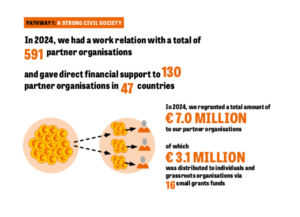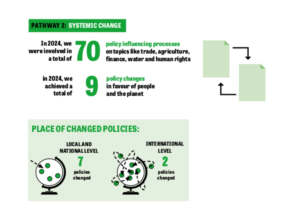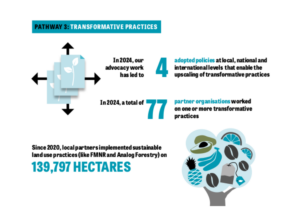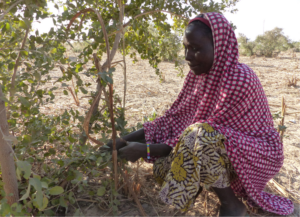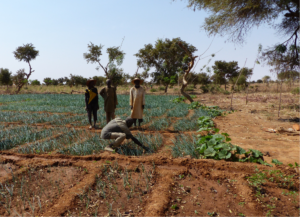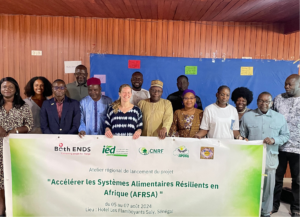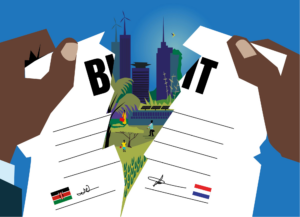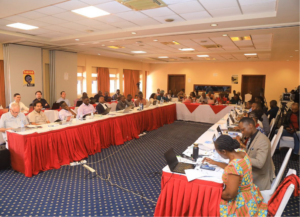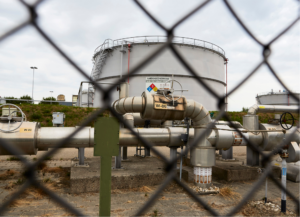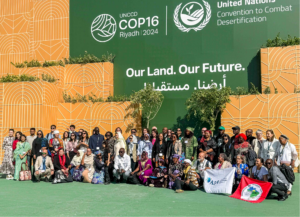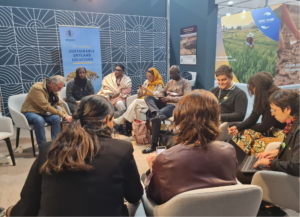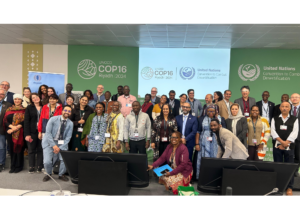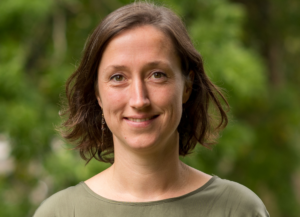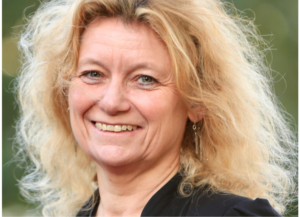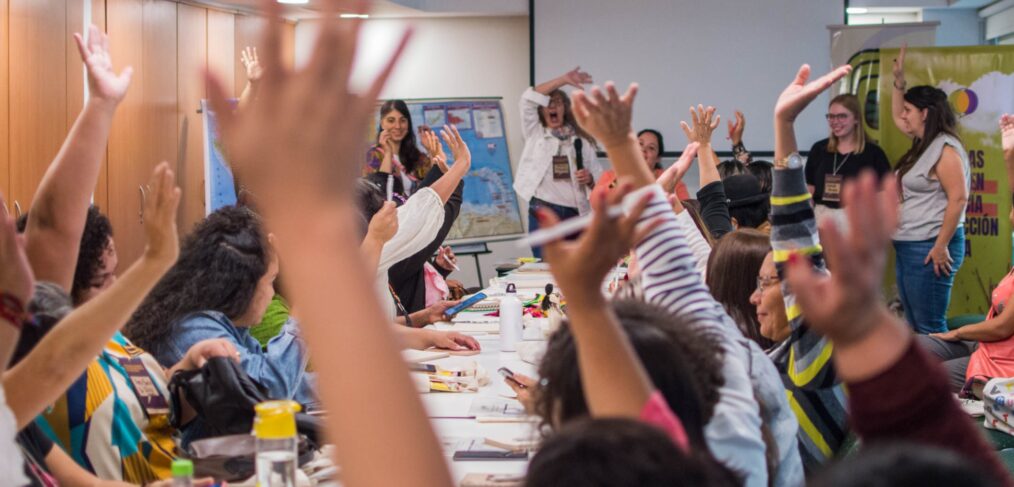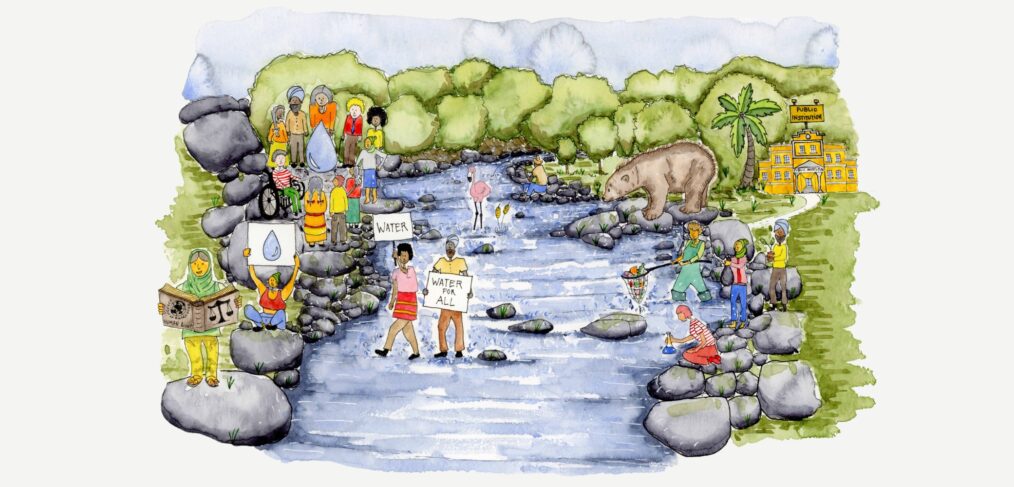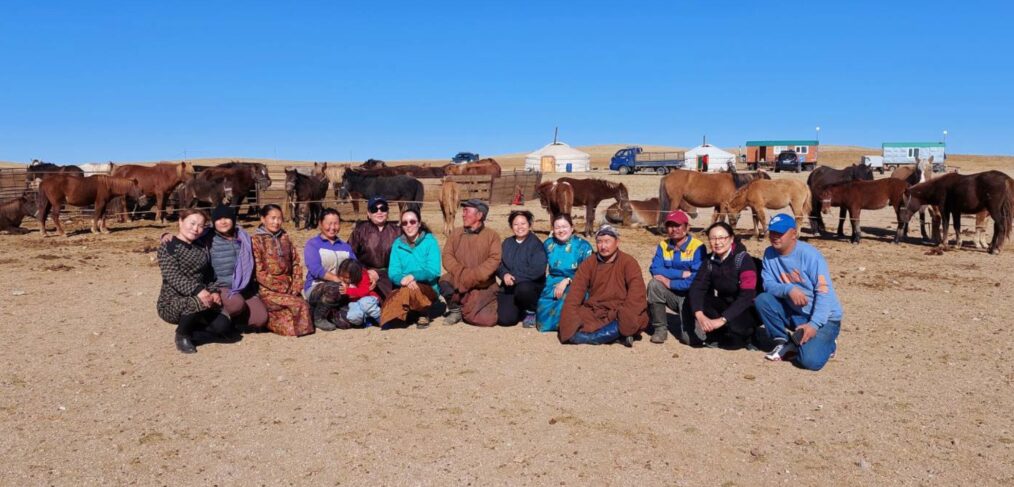To achieve our vision of a sustainable, fair and inclusive world, Both ENDS works to empower civil society, to change the system so it prioritises people and the planet, and to support transformative practices. The numbers and successes below together show the broad variety of our achievements along each one of the three pathways.
STRONG CIVIL SOCIETY
Both ENDS cooperates with many partner organisations around the world to strengthen civil society, advocate for green and fair policies and support transformative practices. This cooperation entails much more then only financial support; we strategise together and each take our own role in our joint efforts for just and sustainable societies. Our partner network embraces the whole world:
SYSTEMIC CHANGE
In order for systems to prioritise people and the planet, Both ENDS and partners aim to change the system step by step, policy by policy. Where policies are already strong, they need to be implemented, and where they are absent, we advocate for new ones to be enacted, on all levels. Influencing policies often is a matter of patience. It might take years until change finally materialises. This is why Both ENDS and partners are involved in such a large number of policy influencing processes:
TRANSFORMATIVE PRACTICES
According to Both ENDS and partners, transformative practices are the future. There are many of these bottom-up, planet-friendly practices. By strengthening and eventually up-scaling transformative practices, Both ENDS and counterparts show tangible examples that can inspire and promote a radically different system that places human and environmental well-being at its core:
SOME EXAMPLES OF OUR IMPACT IN 2024
STRONG CIVIL SOCIETY
- Both ENDS is committed to supporting civil society organisations to influence decision-making and advance environmental justice, including by building strong networks. Since 2007, we have joined forces with partners from all over the world as part of the Drynet network. Drynet has proven its worth as an organising force in the processes of the United Nations Convention to Combat Desertification (UNCCD), among other forums. In 2024, Both ENDS was pleased to join other Drynet members at the UNCCD COP16.
- With repression and insecurity increasing for many of our partners, Both ENDS felt the need to elaborate an internal process to be able to quickly and effectively assist partners in emergency situations. In 2024, we therefore developed what we call a ‘System of Care‘ to be able to do so. It has already shown it’s merit as we were able to give emergency relief – financial and otherwise – to 6 partners from 5 different countries in the same year. The emergency funds were used by partners for a variety of needs, responding to wrongful arrests, kidnapping, credible death threats and violent attacks.
- In 2024, we concluded our Examination of Power process, in which we researched how Both ENDS holds power and how partners experience equity and power in their relationship with Both ENDS. We analysed the results and discussed the learnings with our partners and Both ENDS staff. We are happy to see that a majority of partners describe Both ENDS as an international mission-aligned advocacy partner. And we learned that we hold diverse forms of power, including the power to connect and create new opportunities for partners; to mobilise financial resources and to influence political agendas. We will built upon the learnings and also included them in our next 5 year organisational strategy.
- An important goal of our Dare To Trust initiative was to learn how organisations, when they can decide for themselves, wish to tell their stories. Thus, in 2024 we received a wide range of creative reports from the Women Environmental Human Rights Defenders (WEHRDs) who received a grant, which we bundled together in a magazine. Interestingly, partners and WEHRDs actually enjoyed this ‘reporting’ process. Rather than forcing their work and results into a set of rigid indicators, they were able to highlight what they found to be the most important results, thus enhancing the effectiveness and value of their reporting. As a consequence, the funder and other potential audiences get a much better picture of the real story on the ground, which puts everyone in a better to position to learn from and build on these experiences.
- Both ENDS was member of the Steering Group overseeing the review of the Complaints and Appeals Procedure (CAP) of the Roundtable on Sustainable Palm Oil (RSPO) – the global certification scheme with over 6000 members from the palm oil supply chain. The Steering Group worked closely with the RSPO Secretariat and an expert consultancy group. This resulted in a consensus revised Complaints and Appeals Procedure, ready to be submitted for public consultation. The RSPO CAP guides the handling of a large number of complaints, mostly around land and labour conflicts and ways of ensuring accountability and remedy.
- During the CBD COP16 in Cali, Colombia, the first-ever Irene Dankelman Young Ecofeminist Awards were handed out; an initiative of Women Engage for Common Future (WECF), the Women’s Environment and Development Organization (WEDO), the International Union for Conservation of Nature Netherlands National Committee of the Netherlands (IUCN NL), and Both ENDS, with the objective to honour and amplify the transformative work that young ecofeminist leaders are doing every day in every corner of the globe to create a more gender-just and sustainable planet for all. The award is inspired by the life and work of the late Irene Dankelman, an absolute pioneer in the field of gender and environment and the founding mother of Both ENDS.
SYSTEMIC CHANGE
- Both ENDS collaborates with partners worldwide to tackle the root causes of inequality and environmental degradation, many of which are embedded in the current global trade and investment system. Thanks to decades’ of work on the topic, more and more countries have reconsidered their Bilateral Investment Treaties and the problematic ISDS system. In 2024, the most recent termination of a BIT with the Netherlands was done by Kenya.
- In 2023-2024 Both ENDS together with its partners in the ECA Watch Network has advocated insistingly at the EU for the EU to take a leading role in ending export credit support for oil and gas projects. To this end, among other things, in April 2024 we published a research report into European Member States’ progress in aligning their export credit agencies with the goals of the Paris Agreement. In July 2024, the European Commission publicly declared its position by publishing its proposal for ending ECA support for oil and gas at the OECD. The EU is a global leader in ending ECA support for fossil fuels. This has ended billions of euros per year in support for fossil fuels by European Member States.
- Both ENDS provided advice and our partner GDA provided support to a number of communities in Cameroon who were negatively affected by the construction of the Nachtigal dam on the Sanaga River, funded by the World Bank and a number of other development banks. After filing a complaint to the World Bank in 2022, a mediation process started in 2024. Although in the end the village chiefs were the ones who took part in the negotiations, the process leading to the complaint and the mediation was inclusive. Thanks in particular to the efforts of GDA, the women from the communities had organised themselves to have a voice in the negotiations on compensation for the damage suffered. The project developer has partially met the need for a number of public facilities that benefit the women in the communities.
- In Uganda, we supported our partners in their promotion of clean energy. Amongst other things, they have been advocating for the enactment of the Consumer Protection and management bill Law to protect consumers from poor-quality solar energy products. Thanks to lobby efforts we are happy to announce that this bill was among the 66 bills to be tabled before parliament for debate and enactment.
- In 2024 Both ENDS, together with Milieudefensie, and partners from Mozambique, have continued their efforts to demonstrate the harms of the Mozambique LNG project and the Dutch public finance from Atradius DSB for this project. In the first quarter of the year, partners from Mozambique visited the Dutch Parliament as well as the Ministry of Foreign Affairs and the Ministry of Finance. In the fall, another meeting was held in the Parliament with the Commission of Finance, to shed light on alleged atrocities that have taken place at the borders of the Mozambique LNG project. Both ENDS and partners have also continued efforts to get information about the project and decision making process, by investing time and effort in Freedom of Information requests. Atradius DSB, at the end of 2024, was one of the few financiers in the Mozambique LNG project that has not yet re-confirmed support. Holding off support puts the needed pressure on the project to ensure accountability for the injustices taken place. Addtionally, pressure has built to ensure independent investigations to the alleged atrocities the magazine Politico reported on in 2024 that took place in 2021 near the project’s premises.
TRANSFORMATIVE PRACTICES
- Since 2018, Both ENDS has cooperated with partners to support local communities in regreening the Sahel. Thanks to the programme, in hundreds of communities in Niger, Burkina Faso and Senegal more and more people are well aware that the roots of a greener future lie under the earth. More than 65,000 farmers are now practicing Farmer Managed Natural Regeneration (FMNR) to facilitate regrowth of trees and shrubs.
- When mapping the Ondiri wetland in our Remote Sensing for Communities project with IHE Delft, it turned out the Nairobi Southern Bypass was aggravating the siltation in the wetland, which hampered the water flow into the Nyongara River (tributary of the Athi river). Local organisation Friends of Ondiri Wetland Kenya learnt about these results and immediately showed local ownership to clean up the silt, leading to a restored wetland and a healthy river flow. This example shows how a combination of data and local initiative can contribute to more inclusive and effective water governance.
- For many years, Both ENDS and NGO Uttaran are working to enhance inclusive water governance in the delta of Bangladesh by involving local communities. Part of this work is the support for local (youth) water committees. In 2024, the Youth Water Committee of Tala Upazila took the lead in cleaning up canals and restoring the flow of water, alleviating the devastating effects of waterlogging. Their engagement gave the members of the Youth Water Committee a deeper understanding of local water governance practices and empowered them to undertake more effective advocacy and sensitization efforts with the relevant authorities, ensuring sustainable and inclusive water governance solutions for the community.
- The Matanza-Riachuelo River, which runs through the city of Buenos Aires, is known to be one of the most polluted waterways in the world. Our partner FARN is working to restore the river basin within the Wetlands without Borders programme. They have appointed it as an important biocultural corridor with not only a natural, but also cultural value. They plant trees, strengthen the protection of the nature reserves in the area, and organise numerous educational activities. For some of the children, this is the first time they experience nature.
- In 2024, our long-time partner International Analog Forestry Network (IAFN) expanded its efforts to empower Analog Forestry practitioners and partner CBOs globally. Amongst other things, they organised webinars on climate resilience and forest restoration, monitoring workshops, and knowledge-sharing exchanges certified. Moreover, eight new Analog Forestry trainers were certified through a virtual Training of Trainers program.
- As part of GAGGA and beyond, Both ENDS supports and amplifies many gender-just climate solutions across the world. The successful gender-just climate solution of the Aadhimalai Producer Company – an indigenous women’s collective who produce and sell Non-Timber Forest Products from a restored forest area – was presented to the state’s Tribal Welfare Department. The senior officers appreciated the model and one expressed the aspiration to launch a Government Scheme inspired by the key principles of the Aadhimalai Producer Company. This is an important step for the promotion of forest restoration and the sustainable use of NTFPs.

